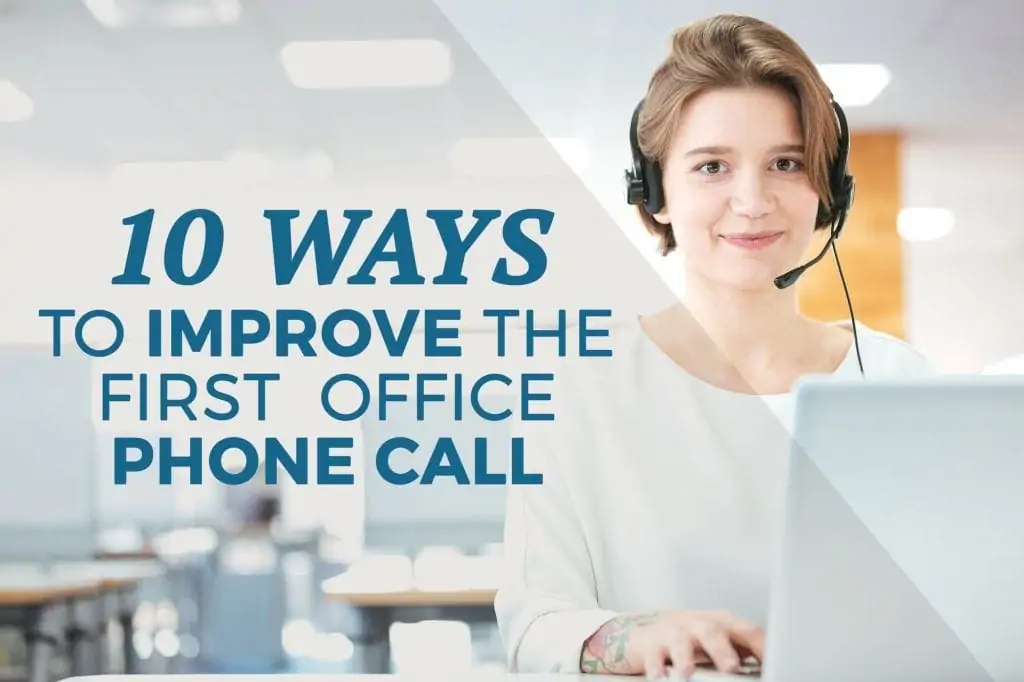First impressions are always important—that goes for the first time someone calls your medical facility or practice. How phone calls are managed, as a matter of fact, can greatly affect the relationships ultimately formed with patients. From that first phone call on, patients formulate opinions that affect their decision-making, including whether they will reward you with their business (or a 5-star google review🤞).
Your goal as a physician or office manager should be to make sure that phone calls coming in are processed competently and courteously. This can only be accomplished if you set up a well-coordinated plan that the staff is required to abide by and held accountable to.
WHY INCOMING PHONE CALLS ARE OFTEN MISMANAGED OR MISHANDLED
Here are some reasons people calling a doctor’s office for the first time can’t get through promptly, are unnecessarily frustrated or are given reasons to take their business elsewhere:
- The greeting is too long, complicated & intimidating.
- The staff makes too many promises they don’t keep (e.g., telling callers they will be called back right away).
- Staff often don’t know how to properly handle questions they aren’t qualified or ready to answer.
- Some staff members tend to patronize some callers, especially if pressed for time.
- Not enough time is set aside for the medical staff to spend on the phone—no wonder they keep rudely saying “I have to go!” to patients, assuming they can answer calls at all.
- Very little training is often provided on how to properly manage phone requests, questions & complaints.
- Sometimes, no one answers the phone, even when people call back repeatedly.
- Staff is sometimes either too chatty/social or too cold/impersonal to people calling in; you may have to monitor & train staff to effect meaningful changes, if necessary.
SOME SOLUTIONS FOR PHONE CALL PROCESSING SHORTCOMINGS
Making sure that patients calling in for the first time are treated respectfully, promptly, amicably and helpfully can be accomplished by requiring some proactive procedures for all staff members. The better you spell it out for everyone, the less opportunity for miscommunication and misunderstandings will exist.
Here are 10 suggestions:
-
- Shorten, clarify & simplify the greeting. If you added up the time wasted by forcing callers to listen to overly-complicated, seemingly-unending greeting, you would see why so many people get angry. Shortening and simplifying greetings is a necessary change if you want to improve incoming call stats, patient reviews & over-all office efficiency.
- Better standardize when & how incoming calls will be returned. In most medical settings, it’s up to staff members how to handle or respond to questions and requests. That isn’t a good idea. You would do better by providing standard responses for major scenarios; those “responses,” however, shouldn’t be superficial or patronizingly unrealistic. Warn your staff to never tell people “I’ll call you right back!” unless they mean it. Instead of vague, probably-not-feasible generic responses, staff should instead say: “Someone will call you back by the end of the business day” or “I’ve put you on our ‘Call Back’ list.” Consider creating (if you presently don’t use one) a list of all incoming calls. Next, to each call, the following categories may be checked off (as many as apply) by whoever picks up the call: “Resolved”; “Call Back”; “High Priority”; “Possible Complaint”; “Issue for Doctor/Nurse”; etc.
- Reduce or eliminate the number of rings patients are forced to listen to. If your machine is supposed to pick up most (if not all) calls, then why does it ring more than once?
- Train your staff to handle phone calls according to specific guidelines that remove ambiguity, make it clear everyone must be treated properly, & greatly reduce complaints & mishaps. For example, require the person who received the original call to own the situation until he/she resolves it officially delegates it to someone else. For accountability, have the staff person put his/her initials next to the phone call on the “Incoming” list. Other requirements may include:
- Calls must be returned by the end of the business day (even if it’s just to say that a more specific answer will be given the next day).
- Staff members may not rudely hang up on any caller (unless the caller uses foul language, threatens someone, or refuses to end the conversation).
- They may not promise anything unless they know with 100% certainty they can deliver it.
- They must report phone calls to the appropriate fellow staff person or supervisor promptly,
- They must accurately & meticulously document every phone call event or incident; these may serve as useful records for future interactions (if any).
- Create special communication portals/bridges just for your patients. This should give patients a more convenient & quicker way to get through than, say, visitors, people trying to sell you something, or the press. This may include a separate phone line, a separate email address, and designated times when office personnel will be available just to answer patients’ calls.
- Have on hand instructive/educational material that may answer questions and address patients’ concerns. These are ready-made sources that callers can be referred to. Providing this information can cut down on time spent dishing out the same information over and over.
- Put what the patient is told in writing. People tend to forget what you tell them verbally/orally, so, in order to keep from answering the same questions, send emails that summarize the information given over the phone; you can also send them brochures/pamphlets electronically or through snail mail. Then again, this is a good policy for the long haul. Everything the patient is told after that initial phone call needs to be committed to paper, including the diagnosis, recommended action, meds prescribed, what the patient should avoid, things they should be doing before or for their next appointment, any referrals, etc.
- Consider hiring another person to better manage phone calls, or let staff take turns permanently attending to the phone. In an attempt to cut costs, some doctors/managers just let phones ring, but this can be a costly mistake if, in the long run, you end up losing patients or not promptly resolving problems that may exacerbate.
- Provide special training for all staff on conflict resolution, how to deal with an irate, potentially violent caller, threats made over the phone, phone calls warning of a bomb or other hidden threat, etc. The assumption is that staff members can improvise when these situations come up but that’s, at best, a naïve strategy
- Train your staff to assume a “Problem Solver” attitude and perspective toward all callers. You will find that, if anything, office personnel are often trained (or allowed) to play the opposite type of role: “get rid of the caller ASAP, don’t get personally involved regardless of what you hear, answer questions promptly but then politely tell the person that you have to go, etc.”
Employees are sometimes told to take the path of least resistance and to, essentially, give merely superficial PR. While these approaches can indeed save time, they may also come back to bite you in the rear end in the long run.
CONCLUSION
How your staff handles phone calls, especially the incoming ones, can greatly affect how your practice is viewed by patients. It doesn’t matter who answers the phone. Whether a lowly-placed receptionist or a highly-paid RN answers the phone, the rules of good, medical office phone etiquette remain the same.
While a receptionist isn’t qualified to answer medical questions, the RN is probably not qualified to answer administrative questions, including billing or insurance inquiries. Level of knowledge, therefore, doesn’t necessarily eliminate the need for all office staff to know and follow the same rules and guidelines.
At very least, having these rules will improve efficiency, avoid common problems & complaints, and improve the chances of patients having beneficial and amicable interactions with your staff.





